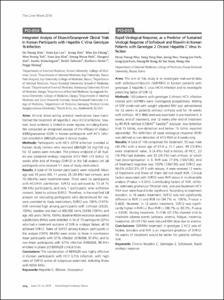KUMEL Repository
1. Journal Papers (연구논문)
1. School of Medicine (의과대학)
Dept. of Internal Medicine (내과학)
Integrated Analysis of Elbasvir/Grazoprevir Clinical Trials in Korean Participants with Hepatitis C Virus Genotype 1b Infection
- Keimyung Author(s)
- Chung, Woo Jin
- Department
- Dept. of Internal Medicine (내과학)
- Journal Title
- 대한간학회 춘·추계 학술대회
- Issued Date
- 2018
- Volume
- 2018
- Issue
- 1
- Keyword
- Hepatitis C; Elbasvir; Grazoprevir
- Abstract
- Aims: All-oral direct-acting antiviral medications have transformed
the treatment of hepatitis C virus (HCV) infection; however,
local evidence is limited in some regions, including Korea.
We conducted an integrated analysis of the efficacy of elbasvir
(EBR)/grazoprevir (GZR) in Korean participants with HCV infection
enrolled in EBR/GZR phase 3 clinical studies.
Methods: Participants with HCV GT1b infection enrolled at
Korean study centers who received EBR/GZR 50 mg/100 mg
for 12 weeks were included. The primary endpoint of all studies
was sustained virologic response (HCV RNA <15 IU/mL) 12
weeks after end of therapy (SVR12) in the full analysis set (all
participants who received ≥1 dose of study medication).
Results: A total of 74 Korean participants were included. Mean
age was 55 years (SD, 11 years), 25 (33.8%) had cirrhosis, and
70 (94.6%) were treatment-naïve. There were no participants
with HCV/HIV coinfection. SVR12 was achieved by 73 of 74
(98.6%) participants; and only 1 participant, who withdrew
consent, failed to achieve SVR12. Therefore, in the modified full
analysis set (excluding participants who discontinued for reasons
unrelated to study medication), SVR12 was 100% (73/73).
SVR remined high among participants with cirrhosis (25/25,
100%), baseline viral load >2,000,000 IU/mL (34/34 (100%), and
age >65 years (16/16, 100%). Baseline NS5A resistance associated
substitutions (RASs) were detected in 16 of 73 participants (22%)
who had a treatment outcome of SVR or virologic failure; all 16
achieved SVR12. Rates of SVR12 among Korean participants in
this analysis (73/74, 98.6%) were similar to those in non-Korean
Asian participants with GT1b infection (378/388, 97.4%), and to
non-Asian participants with GT1b infection (589/608, 96.9%)
enrolled in phase 2/3 EBR/GZR clinical trials.
Conclusions: The combination of EBR/GZR was highly effective
in Korean participants with HCV GT1b infection, with high
rates of SVR12 across all subgroups examined, including those
with NS5A RASs.
- Keimyung Author(s)(Kor)
- 정우진
- Publisher
- School of Medicine (의과대학)
- Citation
- Do Young Kim et al. (2018). Integrated Analysis of Elbasvir/Grazoprevir Clinical Trials in Korean Participants with Hepatitis C Virus Genotype 1b Infection. 대한간학회 춘·추계 학술대회, 2018(1), 104–104.
- Type
- Article
- Appears in Collections:
- 1. School of Medicine (의과대학) > Dept. of Internal Medicine (내과학)
- 파일 목록
-
-
Download
 oak-2018-0629.pdf
기타 데이터 / 209.27 kB / Adobe PDF
oak-2018-0629.pdf
기타 데이터 / 209.27 kB / Adobe PDF
-
Items in Repository are protected by copyright, with all rights reserved, unless otherwise indicated.